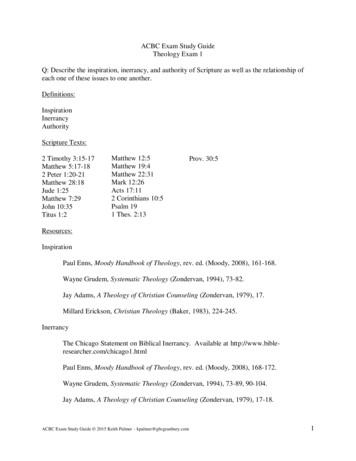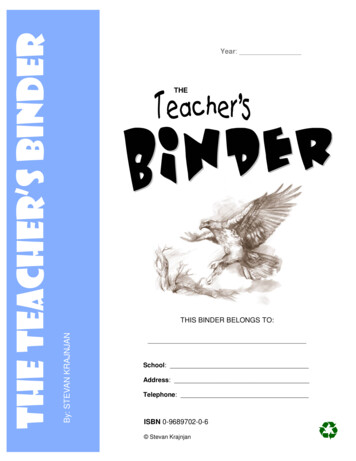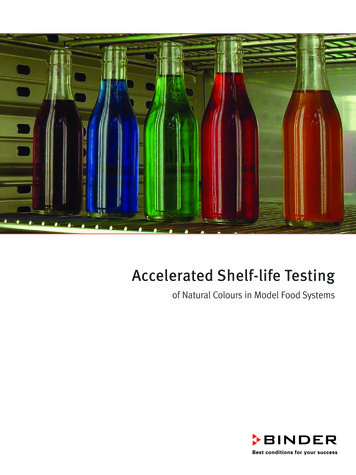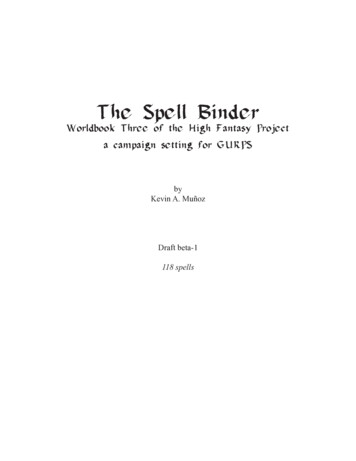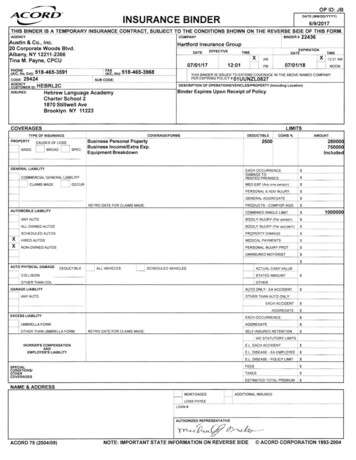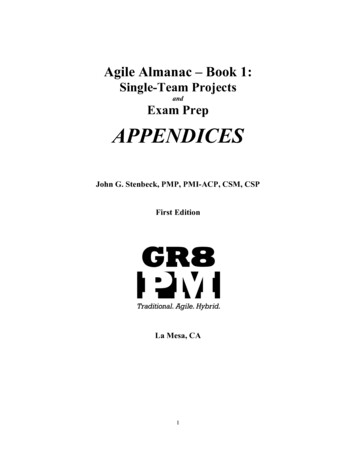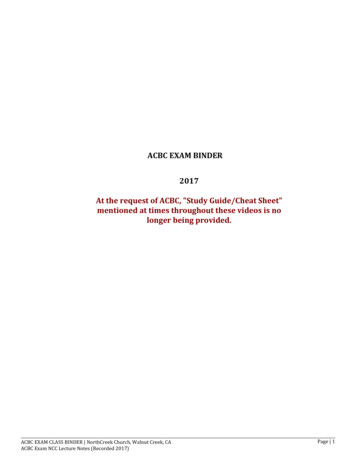
Transcription
ACBC EXAM BINDER2017At the request of ACBC, "Study Guide/Cheat Sheet"mentioned at times throughout these videos is nolonger being provided.Page 1ACBC EXAM CLASS BINDER NorthCreek Church, Walnut Creek, CAACBC Exam NCC Lecture Notes (Recorded 2017)
NorthCreek ChurchSuggestions for ACBC Exam Preparation1. Read and follow the exam guidelines found on biblicalcounseling.com. Scour their sitefor all the info you can find and save it an organized fashion.2. One of the guidelines is that your answer to each question must be 1 – 1.5 pages long.While some questions are impossible to do in just one page, most can be properly butsuccinctly answered in one complete page. Strive for that.3. Your answers are not research papers, sermons, or Bible studies. Don’t debatealternative views unless the question calls for it. Don’t write an introduction to eachquestion. Don’t try to “teach” the reader (grader). The reader knows the answer. Justanswer the question at hand in essay format.4. Don’t write about what “most people” think. Just write what you believe and back it upwith Scripture.5. Always support your biblical statements with parenthetical references to Scripture.Don’t demote Scripture to a footnote or endnote.6. At the same time, do not quote lengthy portions of Scripture. You may occasionallyquote a line or so, but summarize longer passages (if needed) and note the reference.7. Read each question very carefully. Some questions have multiple parts, some don’t. Besure that your answer addresses the question directly and completely.8. If the question has multiple parts, make sure to answer each part explicitly. Don’t makeyour reader hunt for each component within your answer.9. When using online resources, only use reputable ones like biblicalcounseling.com orsimilar. Do not use generic websites like gotquestions.org.10. A couple of the case study questions in the counseling section ask you to write youranswer as if you were speaking it to the counselee. Pay careful attention to when this isasked of you and when it is not. And when it is, make sure that what you write isactually what you would say to someone. If need be, read the answer to your spouse orfriend to see how it comes across.11. This is an open book exam. Unless you’ve had counseling training before, you willalmost certainly need to reference books and articles (see the exam study guides). Takeadvantage of that to ensure your answers are complete. At the same time, you are notexpected to quote sources. This is exam is about your personal understanding andability to explain truth a counseling principles. If your answers are full of quotes fromsources, you may be asked to rewrite them.Page 2ACBC EXAM CLASS BINDER NorthCreek Church, Walnut Creek, CAACBC Exam NCC Lecture Notes (Recorded 2017)
ACBC 2017 Exam ClassGoal:Give you a format to answer most of the questions so that it flows well in your mindand on paper for the reader.Here is your answer outline:1. Start by defining the terms used so that the grader knows what you’retalking about.2. What does the Bible say? This is not the time to say what someone else saysor thinks. Use clear statements.3. What do you believe? Again, not what does someone else believe or say;just what you believe.For each question, the Exam Study Guide has 1 page that includes definitionsthey are looking for, Scripture texts that they think apply, and resources youcan use.As I go through the answers, I will be giving you more than you need. Your job is tolisten carefully, ask questions, and think about what is most important to say andwhat is filler. Think about what you, as a reader, would most want to see as hereads your paper.Your first few are the most important b/c it will encourage and give confidence toyour grade . . . or not. Start well, crisp, concise, on point.We’ll do 2-3 questions/night, but you can write them at your own pace. I willaccept them whenever you send them.At the request of ACBC, "Study Guide/Cheat Sheet" mentioned at timesthroughout these videos is no longer being provided.Page 3ACBC EXAM CLASS BINDER NorthCreek Church, Walnut Creek, CAACBC Exam NCC Lecture Notes (Recorded 2017)
Theology Question 11. Describe the inspiration, inerrancy, and authority of Scripture as well as therelationship of each one of these issues to one another.A. Defining the terms:1. Inspiration – Theo – God; Pneo – to breath – breathed out by God. The very breathof God. This is important b/c it guarantees it is from God, not manand because of its effect on inerrancy and authority2. Inerrancy – Scripture, in its original manuscripts does not affirm anything that iscontrary to fact. This means the Bible always tell the truth, and italways tells the truth concerning everything it talks about. It may nottell us every fact there is to know about any one subject, but it affirmsthat what it does say about any subject is true.Therefore, the contents of Scripture, including doctrine, history,science, and geography are without defect, even if it is vague orimprecise.o If I say 8000 people died, but actually 8001 died, would I betelling the truth? The answer is in what was intended to becommunicated by the statement of fact or the precision thatwas implied by the speaker and expected by his originalhearers.o It allows for the impreciseness of quotes. Written Greek atthe time of the NT had no quotation marks or equivalentkinds of punctuation, and an accurate citation of anotherperson needed to include only a correct representation of thecontent of what the person said so long as the content is notfalse. This explains how Jesus or Peter could misquote theOT. o It allows for problem passages where what is needed is alinguist to figure it out or archaeologists to find it (i.e., 5 lostcities of the plain from Gen. 13- ‐19 – Sodom, Goborrah, Bela,Zeboim, Admah just southeast of the dead sea).Current challenges to inerrancy –o Only for faith and practice, not matters of science and historyo Not a biblical term (neither is Trinity or incarnation)Page 4ACBC EXAM CLASS BINDER NorthCreek Church, Walnut Creek, CAACBC Exam NCC Lecture Notes (Recorded 2017)
o We don’t have any inerrant manuscripts. Yes, but due to themanuscript evidence, archaeological digs, prophecies andstatistical probability of those prophecies coming true in oneperson, we know that 99% of the words of the Bible are whatthe original manuscript said. And, when we don’t have it, thecontent is never altered.Most important, because God is truth, His Word must also be truth.When one challenges the truthfulness about God’s Word, wechallenge the very character of God Himself.Similarly, since God is perfect, His Word must also be perfect.From Charles Ryrie, “God is true (Rom. 3:4); the Scriptures were breathed out byGod (2 Tim. 3:16); therefore, the Scriptures are true (since they came from thebreath of God who is true).”From E. J. Young, “To assume that God could speak a Word that was contrary toface is to assume that God Himself cannot operate without error. The very natureof God is at stake.”For key verses and resources, see the study Guide3. Authority – definition, “the power or right to give orders, makedecisions, and enforce obedience.” The authority of Scripture means that Scripture has the power to sayhow and what we believe and do, so if it says you should . . . , then youshould (i.e., love your wife; respect your husband).It is not merely an authority or the final authority; it is the authority.This authority comes from God to Jesus through the Word to us(Matt. 28:18- ‐20; Jn. 1:1- ‐14; Lk. 4:1- ‐12)B. How they relate to each other Because it comes directly from God, though written by human hands, itmust be perfect, inerrant, and carry authority. If it were not perfect, itwould be errant and lack authority. It cannot be inerrant if not written byGod, but b/c man is errant in himself. And, the only authority we have iswhat He has given us.Here is one written by one of our counselors:Scripture itself claims to be inspired by God, or “God-breathed,” and usefulfor teaching, rebuking, correcting and training in righteousness (2 Timothy 3:16).Page 5ACBC EXAM CLASS BINDER NorthCreek Church, Walnut Creek, CAACBC Exam NCC Lecture Notes (Recorded 2017)
Even though there were human agents writing down the words, Scripture claimsthat each author was not writing of his own human will, but rather was writingwhatever the Spirit of Christ wanted them to write as the Holy Spirit moved withinthem (1 Peter 1:11; 2 Peter 1:21). Both the Old and New Testaments are consideredto be a part of Scripture. The Old Testament authors knew they were writing thevery words of God (Jeremiah 1:9). We can be confident that the New Testament arealso the very words of God because Peter equates all of Paul’s New Testamentletters with “the other Scriptures” (2 Peter 3:15-16) and because in 1 Timothy 5:18Paul quotes Deuteronomy 25:4 and Luke 10:7, calling them both “Scripture.”Since Scripture is the very words of God it must always be true because Godis true in His character (Romans 3:4). Furthermore, the Bible doesn’t just say that itis true but that it is truth (John 17:17). If God cannot lie (Titus 1:2) then when Hespeaks every single word must be true with absolutely no errors. Scripture is selfattesting in this regard, claiming that it is perfect (Psalm 19:7), true (Psalm 19:9),sure (Psalm 11:7), good without any variation (James 1:17). Scripture does not,however, claim to speak to every subject known to man, yet every subject Scripturedoes address is for our instruction, not just some ethereal truth (Romans 15:4).Scripture contains everything we need to know to be saved, how to live a godly lifeand to grasp a true knowledge of God (2 Peter 1:3).Since Scripture claims to be the words of God delivered through men, andsince His words are the ultimate standard for truth, to deny or disobey Scripture isto deny or disobey God Himself. To be even clearer, it is the written Word of Godthat is our only authority (Psalm 19:7-11; 119:1-176). Jesus rebuked His disciplesfor not believing all that the prophets have spoken (which is now recorded inwriting), showing that man is accountable to obey all of Scripture(Luke 24:25). Similarly, the apostle Paul says very clearly in his letter to theThessalonians that they should not associate with someone who does not obey hiswritten instruction so that they may be put to shame (2 Thessalonians 3:14).If one were to say that the Scriptures were not inspired by God, then the Biblewould just be a collection of man-made thoughts and ideas. How would we knowthat there isn’t more that we should know about God? Since man is sinful and ableto lie, how could we trust all that he has written? If we can’t trust part of the BiblePage 6ACBC EXAM CLASS BINDER NorthCreek Church, Walnut Creek, CAACBC Exam NCC Lecture Notes (Recorded 2017)
because it may be wrong, how do we know which part is wrong? How can we trustany of it? If man’s thoughts are in the Bible, and man’s thoughts are also recorded inextra-biblical writings, why should the Bible have more authority than all otherwritings? The inspiration, inerrancy and authority of Scripture is a three-leggedstool that will fall if even one of the legs is removed.Here is one written by a pastor who recently finished the exam:Inspiration speaks of the manner of God’s special revelation; inerrancy has to dowith the accuracy of all they say; Scripture’s authority speaks of man’s obligationto follow them because of their source, God. The question limits itself to theScriptures; therefore, this response assumes the definition of chapter one of theLondon Confession of Faith of 1689.Inspiration is how God revealed His word to His chosen agents. To speak of plenaryinspiration is helpful, as it helps to restrict it to God alone, that is, it is withoutreference to anything or person. It also helps by lending the idea of absoluteness –God’s inspired word emanates solely from His person and will. That said,“inspiration” is not a biblical word.The locus classicus for inspiration is found in 2 Tim 3:16, where Paul asserts in asentence devoid of verbs that all Scripture is qeophuestov, God-breathed – God’sHoly Spirit intentionally and sovereignly moved men to speak, 2 Pet 1:20---211. 1 Ki22:14 is an example of this direct, plenary inspiration (also, in that case, of itsauthority and the spokesman’s responsibility).Inerrancy means that all the bible affirms is true, factual, and worthy of full reliance.This is, like authority, a logical derivative of inspiration. God cannot lie, Heb 6:18;the Author and Agent of the Scripture can only speak truth because such is Hisnature. The content of the Scriptures’ revelation is dealt with elsewhere in thispaper (#’s 2---4); we are concerned here to describe their quality. P.D. Feinbergincludes two caveats (Evangelical Dictionary of Theology, 157): first, that inerrancyawaits the discovery of all the facts related to what the Scripture purports. Second,1 This inspiration does not override the differing personalities and historical milieus of themen so inspired; in fact God used them, but in such a way that His message was in no waycorrupted by them, but rather enhanced.Page 7ACBC EXAM CLASS BINDER NorthCreek Church, Walnut Creek, CAACBC Exam NCC Lecture Notes (Recorded 2017)
that they must be “correctly interpreted.” It is true that sinful, finite man cannotperfectly handle the Word of truth. But these conditions placed on the doctrine ofinerrancy are too limiting. God’s word is not inerrant because man can or will proveit so; it is inerrant simply because of He who breathed it out.An important qualification must be made. Inerrancy can only be attributed to whatwe call “the original autographs.” That is, as soon as it was copied by a hand otherthan the original human agent’s, total inerrancy is lost.Inerrancy as a subject extends to the narratives. Thus, it is perfectly acceptable tohave the record of someone lying, such as Rachel about the family gods or theHebrew midwives, or Rahab (Gen 31:35; Ex 1:19; Josh 2:4). The truth, or lackthereof, is not the issue. Here we only argue that the Scripture’s record of thoseevents is accurately recorded (and was perfectly transmitted to Moses by the Spirit,and placed in Scripture where it was meant to be and to serve the point God wouldhave it make; thus, context as a hermeneutic is all the more critical, as the incidentsrecorded were meant by God to advance an argument).A final category for this brief answer has to do with the times when Peter, as onlyone example, was “filled with the Holy Spirit.” When he spoke under this particular(and extraordinary) condition he was inerrant. As well, when the Spirit moved Luketo record that and other such incidents he did so inerrantly.Scripture’s authority derives from the doctrine of inspiration. The argument mayseem circular, though it is consistent with the analogy of faith: If the Scriptureswere inspired by the God of the Scriptures, who is what they say He is, then Hisauthority, and therefore the authority of His word is indisputable. Authority alsoderives from inerrancy. A document of any kind that is proven to be error- ‐free is,in that field, authoritative.Authority is, ‘the power to give orders or make decisions; the power or right to director control someone or something.’ Scripture’s authority over us is that of GodHimself. In Matt 12:1- ‐8 Jesus is challenged regarding His disciples’ compliancewith Sabbath regulations. Though it doesn’t say it quite this way, it is fair toparaphrase their question as one of authority, ala Matt 21:23 – “By what authoritydo You allow them to ?” Jesus’ answer is telling; it shows that He viewed Scriptureas fully authoritative and, when rightly expounded, an end to all arguments.These answers have been intentionally circumspect. I have tried to answer themPage 8ACBC EXAM CLASS BINDER NorthCreek Church, Walnut Creek, CAACBC Exam NCC Lecture Notes (Recorded 2017)
almost myopically, leaving the implications for later questions. Inspiration,inerrancy, and authority are logically ordered and related. God inspired certain mento record His word to man, who received that word inerrantly, without error.Because of the person behind that inspiration it is an inerrant word as far as theoriginal autograph. Properly translated (as much as that can mean when finite menset themselves to that task) we are confident that we have that full revelation andconfess that it has full authority in all areas of life it covers.Page 9ACBC EXAM CLASS BINDER NorthCreek Church, Walnut Creek, CAACBC Exam NCC Lecture Notes (Recorded 2017)
Theology Question 22. Describe the sufficiency of Scripture. Relate the doctrine of thesufficiency of Scripture to the practice of biblical counseling. Researchand respond to the arguments of at least one integrationist or ChristianPsychologist regarding the insufficiency of Scripture for counseling.A. Sufficiency defined – it is enough or all that is needed. The term implies thatall that is needed for both salvation and sanctification are within theScripturesB. Key verses Ps. 1:1 – “whatever” Ps. 19:7- ‐11 – 2 Tim. 3:15- ‐17 – salvation and sanctification - ‐ “every good work” 2 Peter 1:3- ‐4 – “everything”C. Modern integrationists Larry Crabb – Maslow’s hierarchy of needs (Physical,security, love/belonging, purpose, self- ‐actualization)2 Townsend and Cloud – Boundaries (Prov. 4:23) James Dobson – Skinnerian – Behaviorism – Self- ‐esteem Minirth and Meier – New Life Clinics David Seamonds – Healing of memories –o Nouthetic counselors have nothing to do with this movement in any ofits forms. There is the David Seamands form, the Ed Smith(Theophostic) form, etc. Seamands speaks of" damaged emotions"and suggests that by "visualizing" Jesus doing what He might havedone during a difficult past incident in answer to [what can only bedescribed as] a role playing prayer, memories and emotions can be"healed." Smith, on the other hand, claims an almost instantaneous"cure" by having counselees drift back into the memory, by stirring upthe darkness of it and then asking Jesus to do something miraculous.Usually, this is a miraculous healing word or picture that thecounselee is supposed to receive directly from Him [not mediatedthrough the Bible]. Nouthetic counselors think that these approachesare unsound because they are unbiblical. Moreover, they assume thatthe counselee's emotions are "damaged" or that his memories need"healing." There is no reason to think that either of these suppositionsis true. Emotions are working just fine when a counselee is havingunpleasant past memories (otherwise he would not feel so bad). Andmemories simply don't get sick; the idea is preposterous - ‐- ‐ even as ametaphor.2 Effective Biblical Counseling, p. 79Page 10ACBC EXAM CLASS BINDER NorthCreek Church, Walnut Creek, CAACBC Exam NCC Lecture Notes (Recorded 2017)
Theology Question 33. Describe your position on the nature of continuing revelation (i.e., prophecy,tongues, words of knowledge). In particular, explain whether you believeprophecy is a present gift in today’s church. Explain the relationship betweenyour understanding of the gift of prophecy and the sufficiency of Scripture.A. Define the terms1. Sufficiency – all that is needed, implying that Scripture alone is allthat is needed for salvation as well as sanctification2. Continuing Revelation Revelation is that which has been revealed by God about himself to man.Continuing revelation suggest that God continues to reveal things aboutHimself through the ongoing gift of prophecy and tongues.3. Prophecy – Predicting the futurePowerful preachingProclaiming a divine revelation that God has spontaneously given youProphetically revealing what is hiddenA prophet in the OT as well as the NT is one who speaks on behalf of theLord (Thus saith the Lord)Today, saying what God has already said4. A word
ability to explain truth a counseling principles. If your answers are full of quotes from sources, you may be asked to rewrite them. _ ACBC EXAM CLASS BINDER NorthCreek Church, Walnut Creek, CA ACBC Exam NCC Lecture Notes (Recorded 2017) Page 2
